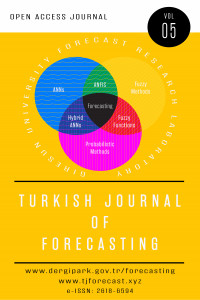Research Article
Aim & Scope
The Turkish Journal of Forecasting (TJF), as an international and multidisciplinary journal, focuses on forecasting methods. The TJF aims to procure a platform to integrate the research subjects and fields, and to bridge over the between theory and practice dealing with any aspect of forecasting. For this purpose, the TJF publishes high quality refereed papers for the benefit of decision and policymakers. The journal slots in research papers including theoretical, practical, computational and methodological research and procedures of enhancement the practice of forecasting. The journal is accessible to various perspectives and to constitute the discussion platform to achieve new solutions for facing real-world forecasting problems. The journal also welcomes the papers dealing with the new concepts of modelling and the contemporary computing-intensive forecasting systems on top of the conventional forecasting models in decision-making processes.
Topics covered in the Turkish Journal of Forecasting (it is not bounded):
- Business forecasting
- Demographic forecasting
- Energy forecasting
- Environmental forecasting
- Financial forecasting
- Legal and judgement forecasting
- Political forecasting
- Technological forecasting
And also the methods covered in the Turkish Journal of Forecasting (it is not bounded):
- The probabilistic and conventional methods
- ARIMA and related models
- ARCH and related models
- Bayesian forecasting models
- Bilinear methods
- Filters and smoothing methods
- Nonlinear time series forecasting models
- Threshold methods
- Time series regression
- The others
- Fuzzy Inference Systems
- ANFIS
- Fuzzy functions approaches
- Fuzzy regression techniques
- Fuzzy arithmetic based methods
- Fuzzy time series (FTS) forecasting models
- Artificial intelligence optimization based FTS forecasting models
- Artificial neural networks based FTS forecasting models
- Clustering based FTS forecasting models
- Artificial Neural Networks (ANNs)
- Different neuron models based ANNs
- Feedforward ANNs
- High order ANNs
- Recurrent ANNs
- Robust learning algorithms based ANNs
- Hybrid Models using computational and probabilistic models
- Forecast combination based forecasting methods
- Ensemble techniques based forecasting methods
- Bootstrap aggregation and other resampling based forecasting methods
The paper types of the TJF include research article (theoretical and practical), review articles, editorials and letters.
Author Guidelines
In Turkish Journal of Forecasting (TJF);
- TJF accepts manuscripts written in English.
- TJF does not charge any submission, publication or processing fees from authors.
Editorial and Review Process
The TJF gives priority to current studies using soft computing research, advanced research and statistical methods and techniques. TJF’s main criteria for publication are the original contribution to the theory, application, and methodology.
Manuscripts are first evaluated by the Editorial Team for the purpose, topic, content, presentation style, and mechanics of writing.
- After the submission, authors are sent a confirmation of receipt by email.
- Manuscripts are evaluated by the Editorial Team following the submission.
- A plagiarism check is conducted by a plagiarism detection software (Turnitin) right after the submission.
- Manuscripts failing the originality check are rejected without further scrutiny.
- Manuscripts that meet the criteria for the TJF proceed to the next stage, which is reviewer evaluation.
- Manuscripts that do not meet the TJF criteria are notified of the decision with the relevant justification for rejection.
- Receipt of manuscripts and Editorial Team decisions may take approximately two weeks.
- Manuscripts are sent to two specialists in the relevant field.
- If the reviewers differ in opinion about the quality of your work, the paper will be referred to a third reviewer.
- The Editorial Team and referee reviews take approximately 2-3 months to complete. This time may be extended depending on the availability of referees in the area that the manuscript is related.
- Reviewer reports are kept confidential. We adopt a double-blind peer-review evaluating process.
- Authors must be attentive to the criticisms, suggestions, and corrections of the referees and the Editorial Board. In case of disagreement with the reports, authors must explain why they do not agree with the points made by the reviewers.
- There are four possible results for a manuscript:
- Accept
- Minor or major revisions
- Reject and Resubmit process
- Rejection
Manuscripts go through the following stages once accepted for publication:
- Reviewer reports and Editorial Team reports are sent to the author.
- Authors revise their manuscripts according to the reports, and the Editorial Team reviews the revised manuscripts before they advance to the proofreading stage.
- Authors are sent the proofreading notes.
- When proofreading is complete, manuscripts advance to the formatting and pagination stage.
- Following the pagination process, authors are asked to conduct a final check of their manuscripts.
- After completion of these processes, manuscripts are published online.
Authors should submit their papers in MS word file. TJF Manuscript Template can be downloaded by the following link
TJF uses the submission system of TUBITAK JournalPark.
- If you have a JournalPark account, please click HERE to submit your paper.
- If you do not have a JournalPark account, before submitting your paper, you need to register at JournalPark system.
Ethical Principles and Publication Policy
The Turkish Journal of Forecasting (TJF) is a double-blind peer review international academic journal. The TJF is committed to the academic community and in this regard, it stands for meeting the highest standards of publication ethics, whereas the publication malpractice is strictly prohibited by all possible measures. That is why it is necessary to agree upon standards of expected ethical behaviour for all parties involved in the act of publishing: the author, the journal editor, the peer reviewer, and the publisher. Our ethic statements are based on COPE’s Best Practice Guidelines for Journal Editors.
For Editors
The editor of the journal is responsible for deciding which of the articles submitted to the journal should be published. The editor may be guided by the policies of the journal’s editorial board and constrained by such legal requirements as shall then be in force regarding libel, copyright infringement and plagiarism. The editor may confer with other editors or reviewers in making this decision. An editor will at any time evaluate manuscripts for their intellectual content without regard to race, gender, sexual orientation, religious belief, ethnic origin, citizenship, or political philosophy of the authors. The editor and any editorial staff must not disclose any information about a submitted manuscript to anyone other than the corresponding author, reviewers, potential reviewers, other editorial advisers, and the publisher, as appropriate. Disclosure and conflicts of interest unpublished materials disclosed in a submitted manuscript must not be used in an editor’s own research without the express written consent of the author.
Author/s declare that:
Author/s declare presence of Ethics Statements that needed for ethical conduct of research using human subjects. Otherwise, they provide the necessary documents.
- Conflict of Interest: They have no conflict of interest.
- Research involving human participants and/or animals: This study does not contain any studies with human participants or animals performed by any of the authors. This article does not contain any studies involving animals performed by any of the authors.
- Informed consent: Informed consent was obtained from all individual participants involved in the study.
For Reviewers
Peer review assists the editor in making editorial decisions and through the editorial communications with the author may also assist the author in improving the paper. Any selected referee who feels unqualified to review the research reported in a manuscript or knows that its prompt review will be impossible should notify the editor and excuse himself from the review process. Any manuscripts received for review must be treated as confidential documents. They must not be shown to or discussed with others except as authorized by the editor. Reviews should be conducted objectively. Personal criticism of the author is inappropriate. Referees should express their views clearly with supporting arguments. Acknowledgement of Sources Reviewers should identify relevant published work that has not been cited by the authors. Any statement that an observation, derivation, or argument had been previously reported should be accompanied by the relevant citation. A reviewer should also call to the editor’s attention any substantial similarity or overlap between the manuscript under consideration and any other published paper of which they have personal knowledge. Privileged information or ideas obtained through peer review must be kept confidential and not used for personal advantage. Reviewers should not consider manuscripts in which they have conflicts of interest resulting from competitive, collaborative, or other relationships or connections with any of the authors, companies, or institutions connected to the papers.
For Authors
Authors of reports of original research should present an honest account of the work performed as well as a discussion of its significance in the field of participatory educational research. Underlying data, and ways of interpreting these, should be represented transparently in the paper. A paper should contain sufficient detail and references to permit others to judge the value of the work. Fraudulent or knowingly inaccurate statements constitute unethical behaviour and are unacceptable. Authors are asked to provide the raw data in connection with a paper for editorial review and should be prepared to provide public access to such data (consistent with the ALPSP-STM Statement on Data and Databases), if practicable, and should in any event be prepared to retain such data for a reasonable time after publication. The authors should ensure that they have written entirely original works, and if the authors have used the work and/or words of others that this has been appropriately cited or quoted. Multiple, redundant, or concurrent publication an author should not in general publish manuscripts describing essentially the same research in more than one journal or primary publication. Submitting the same manuscript to more than one journal concurrently constitutes unethical publishing behaviour and is unacceptable. Proper acknowledgment of the work of others must always be given. Authors should cite publications that have been influential in determining the nature of the reported work. Authorship should be limited to those who have made a significant contribution to the conception, design, execution, or interpretation of the reported study. All those who have made significant contributions should be listed as co-authors. Where there are others who have participated in certain substantive aspects of the research project, they should be acknowledged or listed as contributors. The corresponding author should ensure that all appropriate co-authors and no inappropriate co-authors are included on the paper, and that all co-authors have seen and approved the final version of the paper and have agreed to its submission for publication. All authors should disclose in their manuscript any financial or other substantive conflict of interest that might be construed to influence the results or interpretation of their manuscript. All sources of financial support for the project should be disclosed. Authors cannot make any change on the published manuscript electronically. Therefore, authors are obliged to be careful reviewing and correcting any errors on galley proof.
Related to Plagiarism
The Turkish Journal of Forecasting (TJF) is a peer reviewed and indexed journal having e-ISSN 2618-6594, being published online since 2017. The journal is strictly against any unethical act of copying or plagiarism in any form. All manuscripts submitted for publication to the TJF are cross-checked for plagiarism using Turnitin software. Manuscripts found to be plagiarized during initial stages of review are out-rightly rejected and not considered for publication in the journal. In case of a manuscript that is found to be plagiarized after publication, the Editor-in-Chief will conduct preliminary investigation, possibly with the help of a suitable committee constituted for the purpose. If the manuscript is found to be plagiarized beyond the acceptable limits, the journal will contact the author’s Institute / College / University and Funding Agency, if there is any. A determination of misconduct will lead TJF to run a statement bi-directionally linked online to the original paper, in order to note the plagiarism and provide a reference to the plagiarized material. The paper containing the plagiarism will also be marked on each page of the PDF. Upon determination of the extent of plagiarism, the paper may also be formally retracted.
Price Policy
There is no subscription fee, submission fee or publishing fee.
Indexes
Citation Indexes
Journal Boards
Editorial Board




INDEXING






